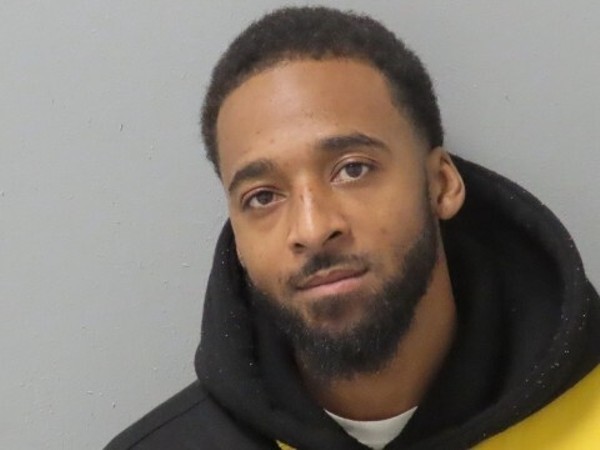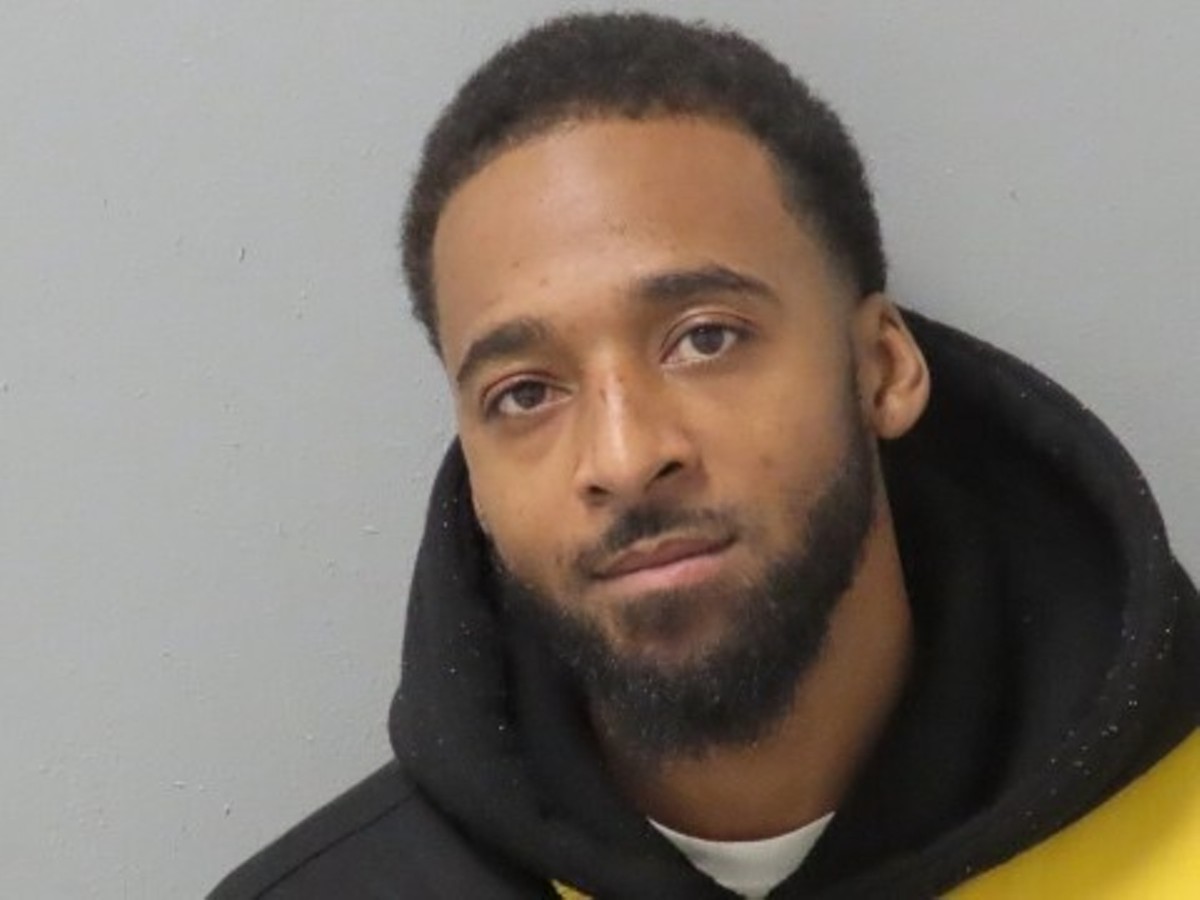Local News
Man Who Threatened Judge and Jury in Daniel Riley Case to Stay in Jail

[ad_1]

An Illinois man who earlier this month made threats against the judge and jury in the high-profile case involving Janae Edmondson will be staying in jail at least a little longer, as a judge denied his attempt to be released while he waits for trial.
Daniel Riley was found guilty of assault after his car pinned Edmondson, a visiting volleyball player, and led to both her legs being amputated.
Erick Buntyn of Madison, Illinois, was in attendance at Riley’s assault trial in St. Louis and, shortly after the jury rendered a guilty verdict, Buntyn allegedly went out into the hall and said, “Fuck the judge and the jury. They are all racists. If I see any of them outside, I’m going to fucking kill them.” He was charged that day with tampering with a judicial officer, a class D felony.
Because the alleged victim in the case was Judge Michael Noble, who sits on the circuit court in the city, the judge who would have typically overseen today’s bond hearing recused herself. St. Charles County Judge Jeffrey Sandcork appeared by video to preside over it.
Representing the Circuit Attorney’s Office was Tanja Engelhardt, who was also a prosecutor on Riley’s case. She argued to Sandcork that Buntyn needed to stay in jail as his case worked its way through the court.
Engelhardt said that such threats against a judge and jurors “puts a chill” on the judicial process — particularly regular people’s willingness to serve on juries.
Noble himself appeared via video call, advocating as the victim in the case for Buntyn to stay locked up.
“I’ve been yelled at and cursed at. It’s part of the job,” Noble said. “This was different.”
Noble said that he was escorted home by a sheriff’s deputy that night and that special precautions had to be taken with jurors as they made their exits. He said that he also felt like the threat was made specifically to affect Riley’s sentencing, which is set to take place in his courtroom April 18.
The jury recommended Riley serve up to 19 years in prison for causing the collision that maimed Edmondson, but it will be up to Noble to determine the exact amount of time Riley will serve.
Pushing back against Noble and Engelhardt was Buntyn’s attorney, Jerryl Christmas.
“In court you have outbursts like this,” he said. “That’s what this was, an emotional outburst.”
Christmas pointed out that the 34-year-old made “no substantial step” to turning the words into action and did not deserve to be held in jail while he awaits his trial.
“A no bond hold is excessive,” Christmas said.
Sandcork ultimately sided with prosecutors, ruling Buntyn should remain in the City Justice Center.
After the hearing, Christmas spoke to the RFT, saying he thought it was bizarre that people accused of killing others are allowed on bond, whereas Buntyn is stuck in jail for his words alone. Christmas cited specifically the case of Monte Henderson, who is accused of reckless driving that caused the death of a mother and daughter after a Drake concert in February. He is currently on house arrest.
“We’ve got people who have committed serious felonies, assault first, assault second, who are walking around out on bond,” Christmas said. “You can’t make it make sense.”
Subscribe to Riverfront Times newsletters.Follow us: Apple News | Google News | NewsBreak | Reddit | Instagram | Facebook | Twitter | Or sign up for our RSS Feed
[ad_2]
Source link
Local News
Fenton Man Charged in Sword Attack on Roommate

[ad_1]

A warrant is out for a Fenton man’s arrest after he allegedly attacked his roommate with a sword.
Police say that on Sunday, Angelus Scott spoke openly about “slicing his roommate’s head” before he grabbed a sword, raised it up and then swung it down at the roommate.
The roommate grabbed Scott’s hand in time to prevent injury. When police arrived at the scene, they found the weapon used in the assault.
The sword in question was a katana, which is a Japanese sword recognizable for its curved blade.
This isn’t the first time a samurai-style sword has been used to violent effect in St. Louis. In 2018, a man hearing voices slaughtered his ex-boyfriend with a samurai sword. His mother said he suffered from schizoaffective disorder.
As for Scott, 35, the St. Louis County Prosecuting Attorney’s Office was charged yesterday with two felonies, assault first degree and armed criminal action. The warrant for his arrest says he is to be held on $200,000 bond.
Subscribe to Riverfront Times newsletters.Follow us: Apple News | Google News | NewsBreak | Reddit | Instagram | Facebook | Twitter | Or sign up for our RSS Feed
[ad_2]
Source link
Local News
Caught on Video, Sheriff Says He’s Ready to ‘Turn It All Over’ to Deputy

[ad_1]

Video of St. Louis Sheriff Vernon Betts taken by a former deputy suggests that the sheriff has a successor in mind to hand the reins of the department over to, even as Betts is in an increasingly heated campaign for reelection.
“I ain’t here for all this rigmarole,” Betts says in the video while seated behind his desk at the Carnahan Courthouse. “The Lord sent me here to turn this department around and I’m doing the best I can and I think I’ve done a good job. I’ve got about eight months and I’m going to qualify for my fourth pension.”
He goes on, “Right now I can walk up out of here and live happily ever after and forget about all this…and live like a king.”
The sheriff then says his wife has been in Atlanta looking at houses and that the other deputy in the room, Donald Hawkins, is someone Betts has been training “to turn it all over to him.”
Asked about the video, Betts tells the RFT, “My future plans are to win reelection on August 6th by a wide margin and to continue my mission as the top elected law enforcement official to make St. Louis safer and stronger. Serving the people of St. Louis with integrity, honor and professional law enforcement qualifications is a sacred responsibility, and I intend to complete that mission.”
The video of Betts was taken by Barbara Chavers, who retired from the sheriff’s office in 2016 after 24 years of service. Chavers now works security at Schnucks at Grand and Gravois. Betts’ brother Howard works security there, too.
Chavers tells the RFT that she was summoned to Betts’ office last week after Betts’ brother made the sheriff aware that she was supporting Montgomery. It was no secret: Chavers had filmed a Facebook live video in which she said she was supporting Betts’ opponent Alfred Montgomery in the election this fall. “Make the judges safe,” she says in the video, standing in front of a large Montgomery sign on Gravois Avenue. “They need a sheriff who is going to make their courtrooms safe.”
In his office, even as Chavers made clear she was filming him, Betts told Chavers he was “flabbergasted” and “stunned” she was supporting Montgomery.
“I don’t know what I did that would make you go against the preacher man,” he says, referring to himself. He then refers to Montgomery as “ungodly.”
Betts goes on to say that not long ago, he was walking in his neighborhood on St. Louis Avenue near 20th Street when suddenly Montgomery pulled up in his car and, according to Betts, shouted, “You motherfucker, you this, you that. You’re taking my signs down.”
Montgomery tells the RFT that he’s never interacted with Betts outside of candidate forums and neighborhood meetings.
“I don’t think anyone with good sense would do something like that to a sitting sheriff,” Montgomery says.
Montgomery has had campaign signs missing and on at least two occasions has obtained video of people tearing them down. (Chavers notes that the sign that she filmed her original Facebook video in front of is itself now missing.)
One man who lives near Columbus Square says that he recently put out two Montgomery signs, which later went missing. “If they keep taking them, I’ll keep putting them up,” he said.
Betts says he has nothing to do with the missing signs. In the video Chavers filmed in Betts’ office, Betts says that his campaign isn’t in a spot where it needs to resort to tearing down opponents’ signs.
“If you sit here long enough, a man is getting ready to come across the street from City Hall bringing me $500, today,” Betts says. “I’m getting that kind of support. I don’t need to tear down signs.”
Subscribe to Riverfront Times newsletters.Follow us: Apple News | Google News | NewsBreak | Reddit | Instagram | Facebook | Twitter | Or sign up for our RSS Feed
[ad_2]
Source link
Local News
St. Louis to Develop First Citywide Transportation Plan in Decades

[ad_1]

The City of St. Louis is working to develop its first citywide mobility plan in decades, Mayor Tishaura Jones’ office announced Tuesday. This plan seeks to make it easier for everyone — drivers, pedestrians, bikers and public transit users — to safely commute within the city.
The plan will bring together other city projects like the Brickline Greenway, Future64, the MetroLink Green Line, and more, “while establishing new priorities for a safer, more efficient and better-maintained transportation network across the City,” according to the release.
The key elements in the plan will be public engagement, the development of a safety action plan, future infrastructure priorities and transportation network mapping, according to Jones’ office.
The overarching goals are to create a vision for citywide mobility, plan a mixture of short and long-term mobility projects and to develop improved communication tools with the public to receive transportation updates. In recent years, both people who use public transit and cyclists have been outspoken about the difficulties — and dangers — of navigating St. Louis streets, citing both cuts to public transit and traffic violence.
To garner public input and participation for the plan, Jones’ office said there will be community meetings, focus groups and a survey for residents to share their concerns. The city will also be establishing a Community Advisory Committee. Those interested in learning more should check out at tmp-stl.com/
“Everyone deserves to feel safe when getting around St. Louis, whether they’re driving, biking, walking or taking public transit,” Jones said in a news release. “Creating a comprehensive transportation and mobility plan allows us to make intentional and strategic investments so that moving around St. Louis for jobs, education, and entertainment becomes easier, safer and more enjoyable.”
Subscribe to Riverfront Times newsletters.Follow us: Apple News | Google News | NewsBreak | Reddit | Instagram | Facebook | Twitter | Or sign up for our RSS Feed
[ad_2]
Source link
-

 Politics2 years ago
Politics2 years agoPrenzler ‘reconsidered’ campaign donors, accepts vendor funds
-
Board Bills1 year ago
2024-2025 Board Bill 80 — Prohibiting Street Takeovers
-

 Board Bills3 years ago
Board Bills3 years ago2022-2023 Board Bill 168 — City’s Capital Fund
-

 Business3 years ago
Business3 years agoFields Foods to open new grocery in Pagedale in March
-

 Business3 years ago
Business3 years agoWe Live Here Auténtico! | The Hispanic Chamber | Community and Connection Central
-

 Entertainment2 years ago
Entertainment2 years agoOK, That New Cardinals/Nelly City Connect Collab Is Kind of Great
-

 Entertainment3 years ago
Entertainment3 years agoSt.Louis Man Sounds Just Like Whitley Hewsten, Plans on Performing At The Shayfitz Arena.
-

 Local News2 years ago
Local News2 years agoFox 2 Reporter Tim Ezell Reveals He Has Parkinson’s Disease | St. Louis Metro News | St. Louis





